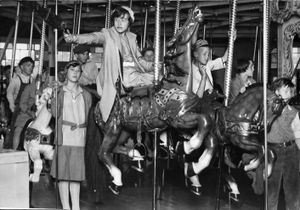A Nat Park memory returns 50 years later
During my three-month sabbatical in Chicago, the "L" train I commute on each day goes over some very old urban tracks as it rounds a corner. I can see the track coming and every time, I have an instant memory of childhood, of Natatorium Park which had the Jack Rabbit roller coaster. It would start out slow and easy and then whoosh!
I sometimes think the "L" train will do the same. Turn the corner and magically transform into the roller coaster from my childhood, transporting me back 50 years.
Many people know that the The Looff CarrouselI, now in Riverfront Park, made its debut at Nat Park, but it's the Jack Rabbit that comes up most in conversations with my Spokane peers who remember Nat.
The roller coaster is a strange but comforting image and memory, as I commute each morning to Rush University Medical Center in an adventure far from home.
(S-R archives photo of The Looff Carrousel)
